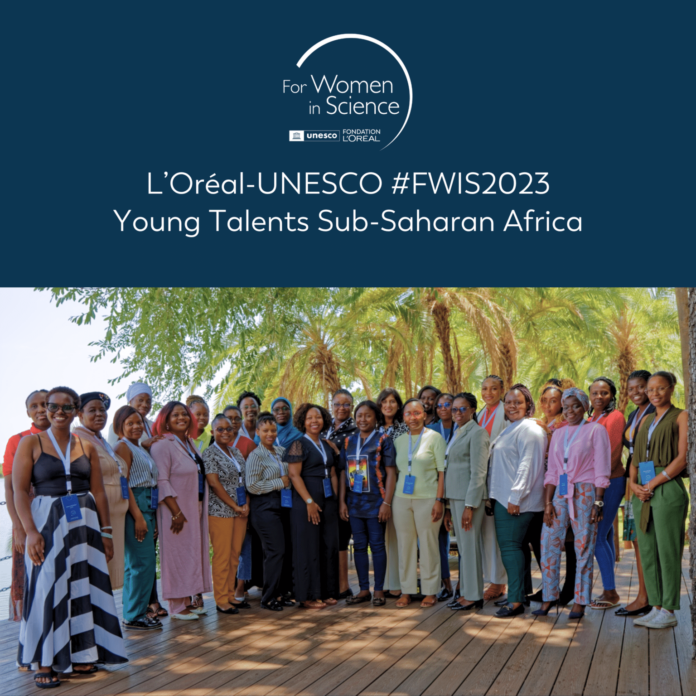Paris, 8th November 2023 The Fondation L’Oréal and UNESCO have proudly announced the 30 winners of the 14th edition of the L’Oréal UNESCO For Women in Science Young Talents Sub-Saharan Africa Awards. This prestigious recognition honors the groundbreaking work of African women scientists and reaffirms the importance of gender equality in science.
Empowering Women Scientists: A Crucial Step for Africa and the World
Scientific research remains a pivotal force in addressing global challenges, yet Africa contributes only 2.5% to the world’s scientific workforce. In an era marked by escalating social, economic, environmental, and health crises, it is imperative to harness all available scientific expertise. Women scientists, often underrepresented in academia and research, play an essential role in driving progress.
For the 14th consecutive year, the L’Oréal UNESCO For Women in Science Young Talents Sub-Saharan Africa Awards recognize the outstanding contributions of female researchers. This year, the program has expanded, awarding 30 promising young scientists—25 PhD candidates and 5 postdoctoral researchers—a significant increase from previous editions. These laureates, representing 17 African nations, including first-time participants from Cabo Verde and Lesotho, exemplify the resilience and innovation required to tackle pressing scientific challenges.
Honoring Excellence in Scientific Research
Selected from a competitive pool of 632 applicants, these brilliant women were chosen by a distinguished panel of 10 experts led by Professor Aggrey Ambali, Director of Technical Cooperation and Program Funding at the African Union Development Agency (AUDA-NEPAD). Their research spans a diverse range of disciplines, including biochemistry, epidemiology, ecology, artificial intelligence, and public health. By pioneering new methodologies and solutions, these scientists are making substantial contributions to the advancement of knowledge and the improvement of life in Africa and beyond.
Fanta Yadang Sabine Adeline, one of the 2023 awardees, aptly stated, “The future of Africa is in the hands of its scientists.” This sentiment is echoed by her fellow laureates, whose groundbreaking work is poised to reshape various scientific fields and inspire future generations.
Encouraging Scientific Dialogue and Mentorship
Providing visible role models for young women is essential to fostering future generations of scientists. To facilitate this, the Young Talents engaged in an intergenerational dialogue on the morning of November 8th with Botswana’s First Lady, H.E. Mrs. Neo Jane Masisi, alongside 150 school students. This knowledge exchange session aimed to inspire young girls to pursue careers in science and technology, bridging the gender gap in STEM fields.
The L’Oréal-UNESCO Young Talents Sub-Saharan Africa Programme
Established in 2000, the L’Oréal-UNESCO For Women in Science Young Talents program has provided over 250 grants annually across more than 110 countries. The initiative not only funds promising researchers but also advocates for the vital inclusion of women in scientific advancements. Over the past 25 years, the partnership between UNESCO and the Fondation L’Oréal has recognized more than 4,100 female scientists at different career stages, celebrating their contributions to scientific progress.
As Lidia Brito, Assistant Director-General for Natural Sciences at UNESCO, emphasized, “The L’Oréal-UNESCO Young Talents are the very future of science. We look forward to working with them to further reinforce the pivotal role of women in science for a sustainable and inclusive future.”
The 2023 laureates will receive financial grants of €10,000 for PhD candidates and €15,000 for postdoctoral researchers. This funding will aid them in advancing their projects and overcoming financial barriers to research. Beyond monetary support, the program offers leadership training, equipping these scientists with the skills needed to navigate professional challenges, including gender biases and work-life balance constraints.
A Call for Collective Action
Scientific progress cannot afford to overlook half of humanity’s potential. “Enabling women scientists to emerge in the public arena and be recognized for the quality of their work requires urgent action,” said Alexandra Palt, CEO of the Fondation L’Oréal. “It is everyone’s responsibility—institutions, companies, and civil society—to ensure that women receive the recognition they deserve.”
Meet the 2023 L’Oréal-UNESCO For Women in Science Young Talents: A Glimpse into Their Research
Southern Africa
- Bhamini SREEKEESSOON (Mauritius): Harnessing tidal energy for a sustainable future.
- Bonolo Bonita PHINIUS (Botswana): Fighting hepatitis B through innovative research.
- Constance CHINGWARU (Zimbabwe): Developing biopesticides from native plants.
- Felicidade NIQUICE (Mozambique): Enhancing occupational health and safety in hospitals.
- Maria Nelago KANYAMA (Namibia): Using AI to combat water scarcity.
- Mesha MBISANA (Botswana): Improving food safety to promote better health.
- Nthabeleng HLAPISI (Lesotho): Advancing phototherapies for cancer treatment.
Central Africa
- Fanta Sabina Adeline YADANG (Cameroon): Exploring medicinal treatments for neurodegenerative diseases.
- Hadidjatou DAIROU (Cameroon): Investigating the healing properties of native plants for cardiovascular disease.
- Lydie Kamga MESSADO (Cameroon): Conservation of orchids in rainforests.
East Africa
- Cheryl KERAMA (Kenya): Studying sugar regulation’s impact on tuberculosis.
- Devotha Godfrey NYAMBO (Tanzania): Using machine learning to prevent infectious diseases in livestock.
- Esther UWIMAANA (Uganda): Towards a tuberculosis vaccine.
- Mwende Mbilo (Kenya): Innovating to enhance solar energy solutions.
- Naelijwa Mshanga (Tanzania): Improving nutrition for women and children.
West Africa
- Aderonke KOREDE (Nigeria): Studying the health benefits of natural ingredients.
- Bernice Konadu AGYEMAN (Ghana): Improving drinking water quality.
- Dorcas Atibilla (Ghana): Analyzing mosquito behavior to fight malaria.
- Fatou Lo Niang (Senegal): Using machine learning to prevent cardiovascular diseases.
- Ini ADINYA (Nigeria): Applying mathematics to optimize investments.
- Pamela Borges (Cabo Verde): Advancing breast cancer research through gene studies.
- Temitope ABIOLA (Nigeria): Enhancing biodiesel efficiency through metabolic engineering.
Conclusion
The L’Oréal-UNESCO For Women in Science Young Talents Sub-Saharan Africa Awards celebrate scientific excellence and reaffirm the crucial role of women in research. By empowering these outstanding researchers, the program is paving the way for a more inclusive and innovative scientific community that will benefit Africa and the world. The continued support of institutions, governments, and the private sector is vital to ensuring that women in science receive the recognition, funding, and opportunities they deserve.
















 The African Research (AR) Index is a comprehensive scholarly directory and database focused explicitly on journal publishers that publish and disseminate African research.
The African Research (AR) Index is a comprehensive scholarly directory and database focused explicitly on journal publishers that publish and disseminate African research.

